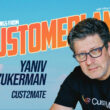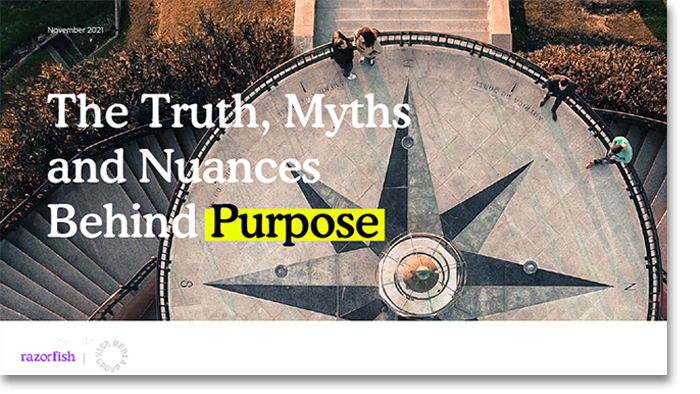Editor’s note: Razorfish and Vice Media Group just released an insightful report entitled, “The Truths, Myths and Nuances behind Brand Purpose” which looks deep into the how’s and why’s of brand purpose & authenticity and what marketers should do with that idea. We sat down for a (virtual) Q&A with Razorfish’s Brand Strategy & Customer Experience Lead, Nicolas Chidiac, to learn more about their findings.
Q.
We’ve published a lot over the past several months on the topics of corporate values & authenticity, but your report adds some important detail that has been missing thus far. Let’s talk about some of your more significant findings:
40% of GenZ consumers surveyed said they actively research a brand’s values and practices as they are making purchase decisions. That’s a huge number! Do you see that as necessarily a generational trait that has more to do with their age / maturity or do you think that may have had something to do with the erosion (very public erosion) of corporate & government trust over the past few years? Or are there other factors involved?
A.
It is a very significant number. Our study didn’t measure historical trajectory, but I’d hypothesize it would show substantial yearly growth around engaging with values and purpose. As far as generational cohorts are concerned, what we found especially interesting about our study is that purpose and values mattered to all stratas of society. Our going-in hypothesis was that purpose is largely associated with a coastal, liberal, wealthier segment of society. In fact, our study shows that purpose matters to all segments of society — cutting across income, age, geography and political lean.


We believe that a couple of factors are at play: 1) There has been a steady decline in trust across a myriad of institutions which would explain why consumers feel that brands – more so than media and governments – have more influence in making the world better; 2) There are several notable brands that have demonstrated the impact that brands can have on society and individuals well being – Dove (redefining beauty) and Bank of the West (responsible finance) are two great examples that stand out.
Q.
There are a lot of marketers out there who will be surprised to hear that for many GenZ’s brand purpose outweighs discounts when choosing a brand. That statistic could & should up-end a lot of the traditional marketing thinking. Talk to us about how brands can adjust their messaging, channels and communication in order to better address these values.
A.
Our Razorfish/VICE Media study reveals two important concepts: 1) Purpose has the ability to drive choice preference over discounts, product innovation, and reviews (all things kept equal, of course) but, more interestingly, it has the ability to drive up willingness to pay by a factor of 1.5x. This finding basically suggests that purpose has the ability to drive both topline and bottom-line growth.
Our recommendation is that marketers don’t start by adjusting messaging or channels; rather, the exercise of articulating brand purpose should start at the core of the business and then radiate outwards to influence marketing channel choices and messaging. Most agencies will advise you to find purpose through some cultural hook or consumer insight, then attempt to find a role for the brand; our point of view at Razorfish is that it actually should start from within an organization.
Q.
Among the principle questions the study aimed to answer were several designed to determine the dollar value / willingness to pay of “purpose”. What did the data end up telling you? Does purpose actually influence something like brand loyalty?
A.
Yes, purpose has the ability to drive a higher willingness to pay — by a factor of 1.5x in some cases – and loyalty too.
Q.
What about the idea of “purpose-washing”? That is, that concepts like purpose & authenticity are just marketing strategies rather than core business values? On the one hand, did your study look at specific companies that might have been less than authentic about who they really are? And on the other hand, how do GenZ’s perceive and deal with inauthenticity?
A.
While the term “purpose washing” might be relatively new, the concept is not. We live in a culture that doesn’t take well to platitudes. A great example of just how much attitudes have changed is the varying response to suggesting that a soda could bring the world together. In 1971, Coca-Cola unveiled the “Hilltop” campaignwhich showcased a group of people from all walks of life singing on a hilltop with bottles of cola. Many describe this as one of the best and iconic marketing campaigns in history; fast forward 40 years and Pepsi basically tried to do something similar with Kendall Jenner and it went down as one of the advertising disasters of the decade. But, frankly, to assume GenZ is going to come after you gives brands a lot more credit than they deserve; in many cases, you’ll probably get an eye roll and they’ll just ignore you.
Q.
Let’s boil this down to its essence – does purpose mean as much to people as they say it does? What were your findings?
A.
We explored this question in two ways: 1) We asked one group of people if their friends buy based on purpose and a second group if they themselves buy on purpose. Our hypothesis was that we would see a large chasm – that people call BS on their friends, and signal on behalf of themselves. Our study did not show that. So one could assume that some accuracy lies in the lack of chasm. 2) We audited growth across the last five years of brands that are considered by people to be purpose-driven brands and compared them to direct competitors that are considered low-purpose, and we found that the purpose-driven brands grow at a multiple of 4x. Now one should not assume causation, as purpose-driven companies can simply be run better. Still, we think there is strong enough indication in our data to support that this is an important and growing attribute that should be taken seriously by brands.
 Nicolas Chidiac is Brand Strategy & Customer Experience Lead at Razorfish. You can download the full report here.
Nicolas Chidiac is Brand Strategy & Customer Experience Lead at Razorfish. You can download the full report here.
Photo by Sunil Ray on Unsplash.














